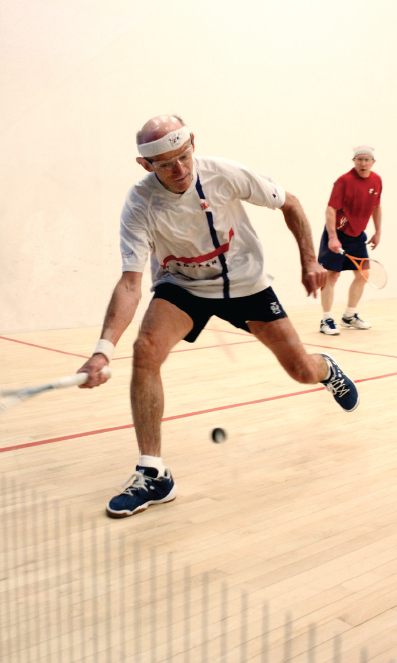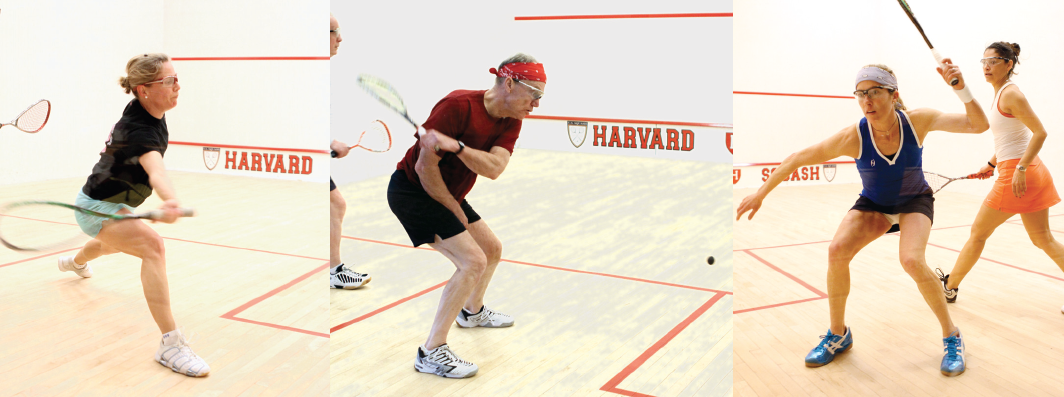
Articles and Photos by Jay. D. Prince/Squashmagazine.com
The last time Harvard University hosted the S.L. Green Men’s Closed Championship, Julian Illingworth had just completed his junior season at Yale and won his first title—becoming only the second college player to do so. His goal was an elusive intercollegiate singles championship.
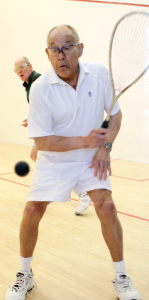
Fast forward six years at the Murr Center, and Illingworth is still racking up S.L. Green titles at record-breaking pace. In early April, Illingworth not only equalled the 88-year-old standard set by Stanley Pearson with his seventh championship, but he’s now chased down Alicia McConnell’s run of seven-straight. With two more, Illingworth will share the lofty pedestal of nine national titles with Demer Holleran. And he’s only 27-years-young.
Far from the anonymity he carried with him in the squash world during his first title run, Illingworth has since won four PSA titles, established a foot-hold in the top-40 rankings over the last three years, and progressed to the second round in three PSA Super Series events. That last feat may seem trivial, but Illingworth is the only American man to ever to taste any success in such prestigious events.
Despite all of his success, Illingworth’s record-equalling performance was nearly cut short by another college player trying to match his performance of 2005. Princeton sophomore, Todd Harrity, pushed Illingworth the brink of elimination in the semifinals just two weeks after winning his first intercollegiate singles title. Harrity dropped the first two games but then showed his poise by taking the next two, 12-10, 11-9. Illingworth was on the ropes, and everyone surrounding the glass court knew it.
Not since 2007, when Illingworth was trying not to crack under the pressure of playing in his hometown of Portland (OR), had he been pushed to five games. He obviously survived that scare against Preston Quick in the final (snapping his racket in half after the win), but this was new territory. Harrity is the picture of calm and Illingworth was struggling to see the ball well. But as champions do, Illingworth summoned his resiliency and wrested control from Harrity to run away with the deciding game, 11-3.
Perhaps it was that match that lit the fire in Illingworth to establish his dominance in the final, because Gilly Lane could muster little resistance as Illingworth easily won, 11-8, 11-7, 11-7.
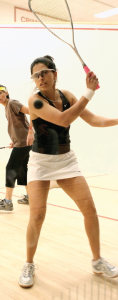
Squash is a sport in which eye-popping winning streaks seem to be, well, normal. There’s Jahangir Khan’s 555 matches; Trinity’s 13 years; and now Illingworth equalling McConnell. Okay, maybe Khan’s numbers are slightly more impressive, but streaks are more intriguing when there is the realistic possibility of seeing them broken. And with Harrity’s performance at Harvard, coupled with his winning the college singles, perhaps there is a new kid on the block to push Illingworth.
On the women’s side, junior players have been pushing Natalie Grainger for the past couple of years. Grainger recently announced her retirement from the WISPA tour, but with a modest streak of her own (4) in the Women’s U.S. Closed Championships, she wasn’t ready to hang up her singles game yet.
In 2010, Grainger showed Amanda Sobhy how the pros play the game but hammering her in three games. This year, it was Olivia Blatchford’s turn as Grainger took the title, 11-6, 11-4, 11-4. However, given the rapidly improving play of both Sobhy and Blatchford, even Grainger’s now five-year run will be fun to follow.
For the players in the Masters divisions, Harvard’s beautiful squash facility is well-suited and situated for hosting all of the matches in a single venue. Not only does it enable players to watch a variety of matches, but they can do so while catching up with old rivals while keeping an eye on what may be coming down the pike. And the Masters has a familiarity to it, though this time around perennial winners like Richard Millman (knee) and Tom Rumpler (shoulder) were forced out before the first ball was struck.
Yes, there were the repeat and multi-peat winners like Jay Nelson (Men’s 65+), Daniel Sharplin (Men’s 35+), Steve Wren (Men’s 45+ who won the last two 40+), Michael Gough (Men’s 70+), Michael Bertin (Men’s 55+), and Juliana Lilien (Women’s 35+). And a pair of players from the Pacific Northwest took home winner’s hardware for the first time in many years.
Mark Alger, from Palmer (Alaska), last reached the finals of a national event when it was played in San Francisco (CA) in 1993 when he was attempting to win his third-consecutive title in the 30+. In this year’s event, Alger was originally seeded 5-8, but after Millman’s forced withdrawal, Millman put in a call to U.S. SQUASH to take care of that oversight. After redrawing the division, Alger was elevated to No. 2 and promptly ran away with the championship without dropping a game, including a convincing win in the final over the No. 1 seed, Richard Sheppard, 11-5, 11-8, 11-9.
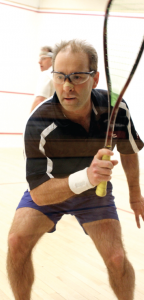
Though it may be somewhat surprising to find a player from Alaska winning US titles, Alger is certainly no newcomer to the game. He moved to Alaska in the mid-90’s, but prior to that was a fixture in the Seattle area—and he won the national singles hardball title in 1981.
Since moving to Alaska, Alger has single-handedly built the game from nothing to hosting the Alaska State Championships at his personal court. Moosewood Squash has not only provided Alger with the necessary space to train, but it’s also welcomed the likes of Sarah Fitz-Gerald a few years ago. Alger’s ever-positive and endearing personality will make you feel welcome should you decide to stop by for a hit while vacationing in the area.
Joining Alger with winner’s hardware was Shabana Khan in the Women’s 40+, after taking several years off for motherhood. The last time Khan won a national title was in 2001 when she beat her sister, Latasha, to capture the Women’s Closed championship. Determined to take home her first masters title, Khan had to do so as a 3/4 seed. Despite dropping the first game to second-seeded Wendy Ansdell in the semifinals, Khan overcame opening-game jitters in the final to beat Hope Prockop in four, 7-9, 11-8, 11-7, 11-4— mission accomplished.
Perhaps the most significant repeat winner this year was Charlie Butt. The draw of elder statesmen (the Men’s 80+) featured nine players, every one of them trying to prevent the ageless wonder from winning yet another championship. To their chagrin, Butt won all three of his matches in just three games, including a 11-9,11-4, 11-6, final over Lee Engler.
The significance of Butt winning really had little to do with adding another trophy to his significant haul. Instead, it was simply appropriate after being recognized by U.S. SQUASH as part of it’s Grand Master Honor Roll (see accompanying story below).
The U.S. Masters is really about competition, camaraderie, and historical perspective. Each year there are repeat winners and newcomers who steal the show. And there are always the rivalries that have grown into lifelong friendships.
Butt and Millet Honored at Masters
Photo courtesy of JD Sloan
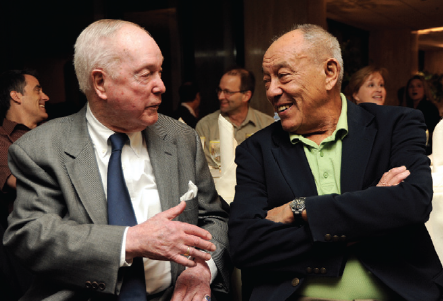
Two distinguished members of the squash community, Charles Butt and Frank Millet, were named to the Grand Master Honor Roll during the Saturday evening dinner at the Top of the Hub in Boston. The award is to recognize squash players whose excellence of play, sportsmanship and passion for squash have helped elevate the game to its current prominence.
Butt, of Harpswell (ME), spent five decades in the Bowdoin College athletic department as swimming and soccer coach and, since the early 1980’s, has won an incredible 21 national titles across hardball and softball singles and hardball doubles.
Millet, the legendary Milton Academy coach, whose motto was “win like gentlemen,” spearheaded the New England powerhouse to squash dominance throughout the past four years, including a two-season stretch where they went 131-10 in individual matches. In 2007, Millet was honored by Massachusetts and U.S. SQUASH when one of the premier junior tournaments in the country was named in his honor.


